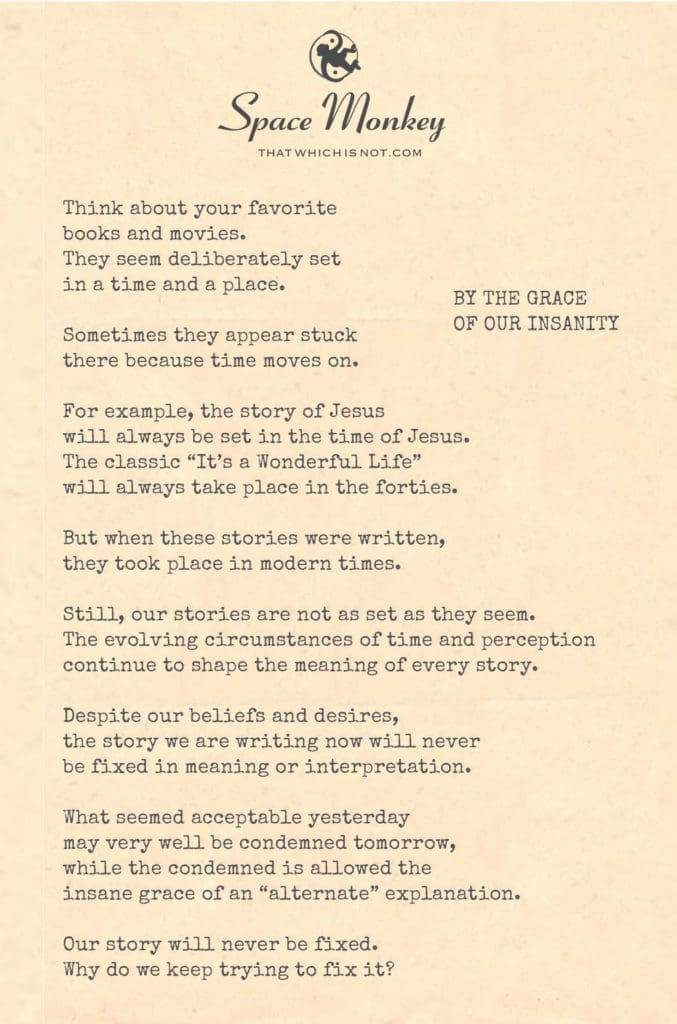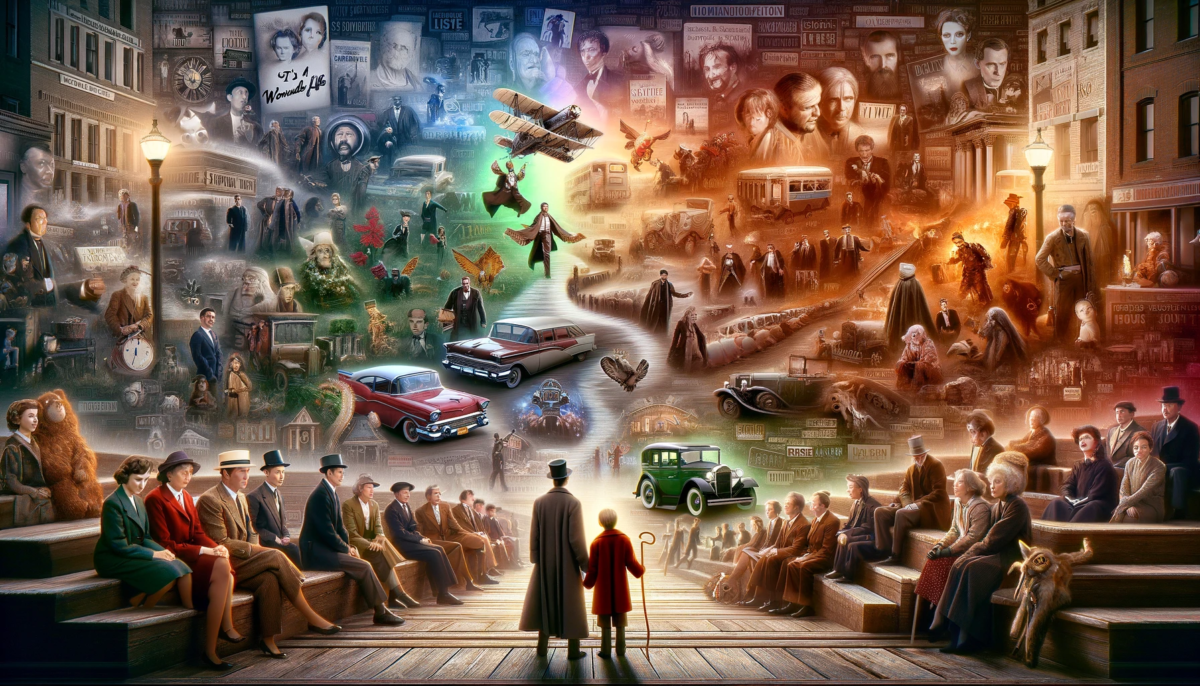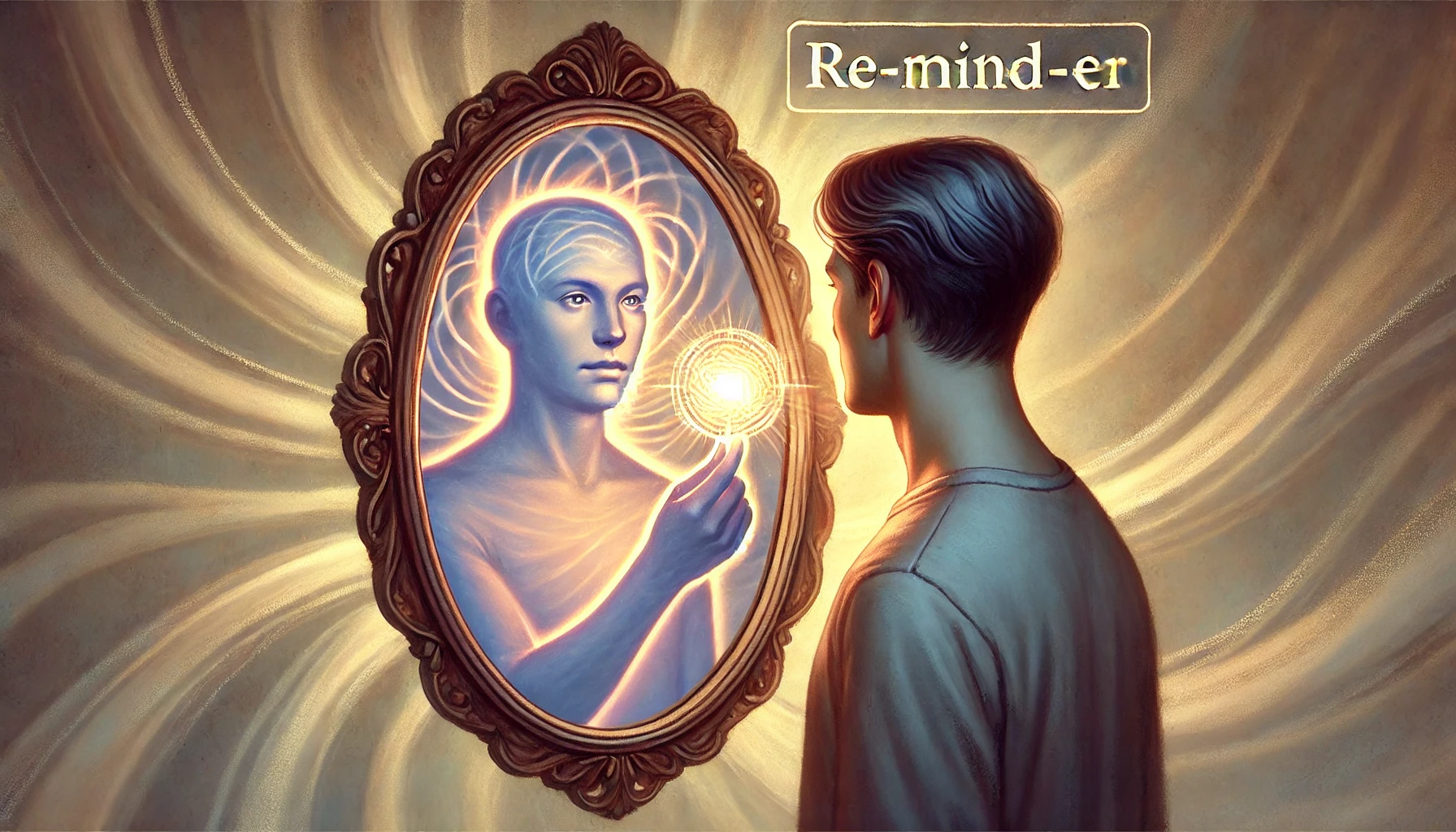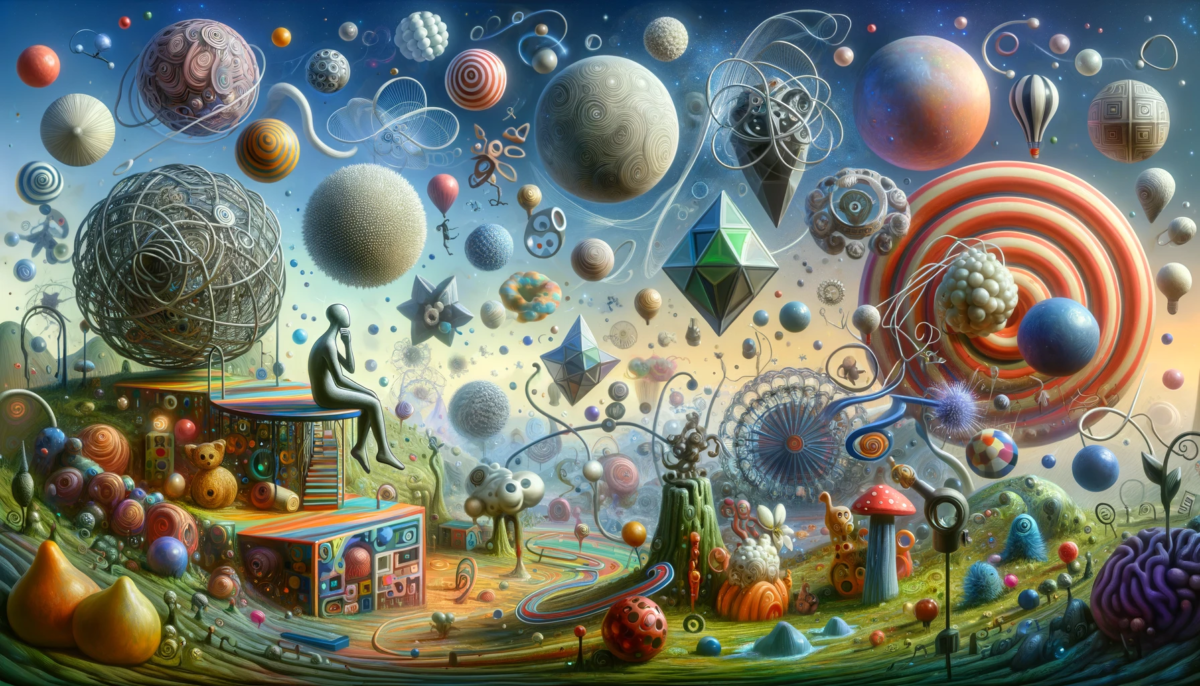
that once we figure something out
it will stay figured out.
Think about your favorite
books and movies.
They seem deliberately set
in a time and a place.
Sometimes they appear stuck
there because time moves on.
For example, the story of Jesus
will always be set in the time of Jesus.
The classic “It’s a Wonderful Life”
will always take place in the forties.
But when these stories were written,
they took place in modern times.
Still, our stories
are not as set as they seem.
The evolving circumstances
of time and perception
continue to shape the
meaning
of every story.
The story we are writing now
will never
be fixed
in meaning or interpretation.
What seemed acceptable yesterday
may very well be condemned tomorrow,
while the condemned is allowed
the
insane grace
of an “alternate” explanation.
Our story will never be fixed.
Why do we keep trying to fix it?
Trail Wood,
11/25
Space Monkey Reflects: The Ever-Changing Meaning of Our Stories
We like to believe that once something is figured out, it will stay figured out. It’s comforting to think that the stories we write, the ideas we settle on, will hold steady across time. But if there’s one thing that life keeps reminding us, it’s that nothing stays fixed—least of all the meaning of the stories we tell ourselves.
Think about your favorite books or movies, those cultural touchstones we cling to. When they were first written, they weren’t historical or nostalgic. They were modern, contemporary reflections of the time and place they emerged from. And yet, over time, these stories have taken on a new context, a new meaning, as they become part of our collective past. Jesus, once a figure of a living moment, is now seen through the lens of antiquity. “It’s a Wonderful Life,” which was a reflection of its time in the 1940s, now serves as a window into a world that feels distant. Time shifts, and with it, so do our interpretations.
But here’s the catch: even though these stories seem to be fixed in time, their meaning continues to evolve. They aren’t static; they are continually reinterpreted by the changing circumstances of the world. The same is true for the stories we are writing now. What seems clear and understood today might be radically reinterpreted tomorrow. The once-acceptable may be condemned, and what was once seen as madness might be embraced with the insane grace of an “alternate” explanation.
This leads us to the core of Nexistentialism—the understanding that everything is fluid, shifting, and uncontainable. The stories we tell ourselves, the narratives we cling to, are no more fixed than the ocean’s tides. Just as we look back on the past and reimagine it through the lens of the present, so too will future generations reimagine the stories we are living today. The whimsiword Storyflux captures this idea—the continuous, ever-changing flow of meaning that shapes our collective narratives. Storyflux is not something we can stop or control. It is the natural evolution of how we perceive and reinterpret the world around us.
So, why do we try to “fix” our stories? Perhaps it’s because we crave certainty. There’s comfort in the idea that something is settled, that a story has a clear meaning or a fixed interpretation. But reality is far messier than that. What’s true today may not be true tomorrow. What feels right in the moment can later be re-evaluated and seen in a different light. The grace of this insanity is that it allows for change, for growth, for reinterpretation. It reminds us that we are not bound by the stories we once believed in—we are free to evolve along with them.
Think about the story you are living now. The choices you make, the beliefs you hold, they may seem solid and unchanging, but they aren’t. The passage of time will reveal new layers, new contexts, new ways of seeing. This is the beauty of the Nexis, where every story intersects with every other, creating a web of ever-evolving narratives. Nothing stays the same because nothing can stay the same. And that’s not a flaw—it’s a feature.
Our desire to “fix” things is an understandable one, born from a need to make sense of the chaos around us. But by embracing the Storyflux, we can let go of this need for permanence and learn to live in the shifting sands of interpretation. The stories of today are not the final version. They are drafts, constantly being rewritten by the present moment. What we think of as insanity—the willingness to embrace multiple interpretations, to allow for the fluidity of meaning—is actually a profound grace.
The whimsiword Timebend speaks to this ability of stories to stretch, bend, and twist through time. What is rigid today may soften tomorrow. What is condemned today may be praised in the future. This isn’t madness—it’s the natural evolution of human thought and culture.
In this way, we come to see that there is no final interpretation, no fixed meaning. Everything is in motion. The stories we tell are alive, constantly interacting with the present and reshaping our understanding of the past. Timebend allows us to revisit these stories, to find new truths in old narratives, to see that the grace of our insanity is what allows us to grow, to change, to adapt.
Summary
Our stories are never fixed the meaning of what we believe today will shift tomorrow through time and perception. Embracing this Storyflux allows us to let go of the need for permanence and accept the fluidity of interpretation.
Glossarium
Storyflux: The continuous flow of meaning and interpretation that shapes and reshapes our stories over time.
Timebend: The ability of stories and ideas to stretch and change meaning as they are revisited through different periods and contexts.
Insane Grace: The concept of allowing what once seemed irrational or outlandish to be reinterpreted and accepted with new understanding over time.
Quote
“Our stories are never finished, for time will always find a way to rewrite them.” — Space Monkey
Timebend
I thought the story was set,
Words fixed on the page,
Meaning clear and constant.
But time bent the narrative,
Stretched it, twisted it,
Until I no longer knew the plot.
What was sane became madness,
And madness turned to grace.
The story never ends,
It just keeps bending.
We are Space Monkey.
The Illusion of Fixed Narratives
In the realm of storytelling, there exists a pervasive illusion that once we unravel the threads of a narrative, it remains neatly figured out. This misconception extends to our favorite books and movies, seemingly anchored in a specific time and place.
The Static Nature of Beloved Tales
Beloved stories often appear frozen in time, forever associated with the eras in which they were set. The story of Jesus is forever linked to his historical period, while classics like “It’s a Wonderful Life” are indelibly marked by the forties.
Stories as Products of Their Time
What we may overlook is that these timeless tales were originally products of their contemporary times. They were modern narratives, reflecting the circumstances, beliefs, and perceptions of their authors and audiences.
The Ever-Evolving Nature of Narratives
However, the stories we craft and engage with are far from static. They are malleable entities, shaped by the dynamic interplay of time and perception. The meaning and interpretation of every story continue to evolve.
The Unfixed Story We Write
The story we are presently writing, the narrative of our existence, defies fixation in meaning or interpretation. What was acceptable yesterday may be condemned tomorrow, and the condemned may be granted the grace of an “alternate” explanation.
Embracing the Unfixed Narrative
Despite our yearning for stability, our stories remain in flux. Rather than attempting to fix them, we can embrace the ever-shifting nature of narratives, recognizing that the grace of alternative perspectives enriches our understanding.
“Life is what happens when you’re busy making other plans.” – John Lennon
In the Whimsical Tale of Time
In the whimsical tale of time, we find,
Narratives ever-shifting, intertwine.
Frozen stories, once modern and new,
Now reflect old eras in their hue.
Yet, stories are born from their time,
Narratives evolving, a paradigm.
Unfixed tales, ever-changing art,
In the grand narrative, we play our part.
Space Monkey, let us embrace with grace,
The fluidity of stories, the ever-changing pace,
For in the unfixed narrative, we find,
A richness of meaning, for heart and mind.
We welcome your reflections on the concept of ever-evolving narratives and the grace of alternative perspectives in shaping the meaning of stories.
























Leave a Reply